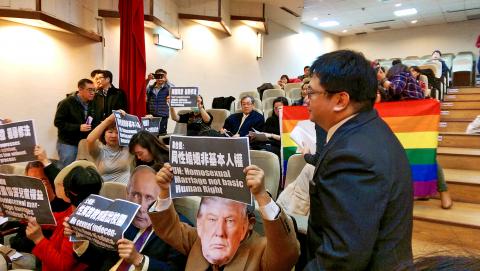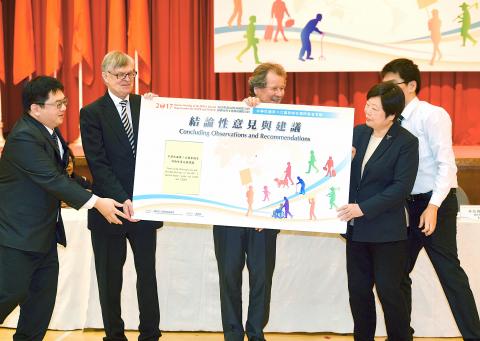International human rights experts yesterday presented a report recommending the abolition of capital punishment, work to relieve prison overcrowding, liberalizing policy over drug users and decriminalizing adultery.
The report listed 78 observations or recommendations for government consideration, following four days of meetings in Taipei this week regarding the International Covenant on Civil and Political Rights (ICCPR) and the International Covenant on Economic, Social and Cultural Rights (ICESCR).
The review was the second of its kind since the covenants were adopted by Taiwan in 2009.

Photo: Hsiang Cheng-chen, Taipei Times
The ICCPR panel was chaired by Manfred Nowak of Austria, former UN special rapporteur on torture, while the ICESCR panel was chaired by Eibe Riedel of Germany, former vice chairman of the UN Committee on Economic, Social and Cultural Rights.
Nowak urged President Tsai Ing-wen (蔡英文) to take decisive steps by introducing a moratorium on executions, with the aim of full abolition of the death penalty in the near future.
“The committee is also concerned about overcrowding of detainees in the prison system, which leads to a variety of human rights problems, such as poor hygiene, a lack of privacy and increased violence,” Nowak said in presenting the report at the Ministry of Justice building yesterday.

Photo: Peter Lo, Taipei Times
“We recommend the government constructs new prison facilities and reduces the number of detainees by liberalizing some of the harsh policies regarding drug users,” he said.
The committee recommended legislative changes to reduce the length of criminal proceedings and to provide adequate reparation in cases of excessive detention, Nowak said.
The government should also take steps to decriminalize adultery, as it has a disproportionately negative affect on women and is a violation of the right to privacy, Nowak said.
Nowak said that “Taiwan can show it could be a pioneer in the Asia-Pacific region to combat discrimination on the basis of sexual orientation and gender identity.”
The ICESCR report said that while the government had taken steps to recognize the status of Pingpu as Aborigines, it is concerned that the classification of Aborigines into three categories — “mountain people,” “plains people” and “Pingpu” — is a legacy of the Japanese colonial period and does not correspond with the present situation of 16 official Aboriginal groups.
“The committee recommends that the government apply the classification of indigenous peoples as identified by themselves, and guarantees them full and equal participation and representation,” it said, adding that the government should “develop effective mechanisms to seek free, prior and informed consent of indigenous peoples on development programs that affect them.”
Miloon Kothari of India, a former UN special rapporteur on housing, said that government policies must move away from an emphasis on economic development and favoring businesses to the detriment of marginalized groups, poor people and Aborigines, as they have led to land expropriation.
Minister Without Portfolio Lin Mei-chu (林美珠), who co-chaired yesterday’s event, said that capital punishment remains in force because most Taiwanese support it and there has been no decline in the number of executions in recent years.
Groups opposing and affirming same-sex marriage staged protests at the event.

SECURITY: As China is ‘reshaping’ Hong Kong’s population, Taiwan must raise the eligibility threshold for applications from Hong Kongers, Chiu Chui-cheng said When Hong Kong and Macau citizens apply for residency in Taiwan, it would be under a new category that includes a “national security observation period,” Mainland Affairs Council (MAC) Minister Chiu Chui-cheng (邱垂正) said yesterday. President William Lai (賴清德) on March 13 announced 17 strategies to counter China’s aggression toward Taiwan, including incorporating national security considerations into the review process for residency applications from Hong Kong and Macau citizens. The situation in Hong Kong is constantly changing, Chiu said to media yesterday on the sidelines of the Taipei Technology Run hosted by the Taipei Neihu Technology Park Development Association. With

CARROT AND STICK: While unrelenting in its military threats, China attracted nearly 40,000 Taiwanese to over 400 business events last year Nearly 40,000 Taiwanese last year joined industry events in China, such as conferences and trade fairs, supported by the Chinese government, a study showed yesterday, as Beijing ramps up a charm offensive toward Taipei alongside military pressure. China has long taken a carrot-and-stick approach to Taiwan, threatening it with the prospect of military action while reaching out to those it believes are amenable to Beijing’s point of view. Taiwanese security officials are wary of what they see as Beijing’s influence campaigns to sway public opinion after Taipei and Beijing gradually resumed travel links halted by the COVID-19 pandemic, but the scale of

A US Marine Corps regiment equipped with Naval Strike Missiles (NSM) is set to participate in the upcoming Balikatan 25 exercise in the Luzon Strait, marking the system’s first-ever deployment in the Philippines. US and Philippine officials have separately confirmed that the Navy Marine Expeditionary Ship Interdiction System (NMESIS) — the mobile launch platform for the Naval Strike Missile — would take part in the joint exercise. The missiles are being deployed to “a strategic first island chain chokepoint” in the waters between Taiwan proper and the Philippines, US-based Naval News reported. “The Luzon Strait and Bashi Channel represent a critical access

Pope Francis is be laid to rest on Saturday after lying in state for three days in St Peter’s Basilica, where the faithful are expected to flock to pay their respects to history’s first Latin American pontiff. The cardinals met yesterday in the Vatican’s synod hall to chart the next steps before a conclave begins to choose Francis’ successor, as condolences poured in from around the world. According to current norms, the conclave must begin between May 5 and 10. The cardinals set the funeral for Saturday at 10am in St Peter’s Square, to be celebrated by the dean of the College